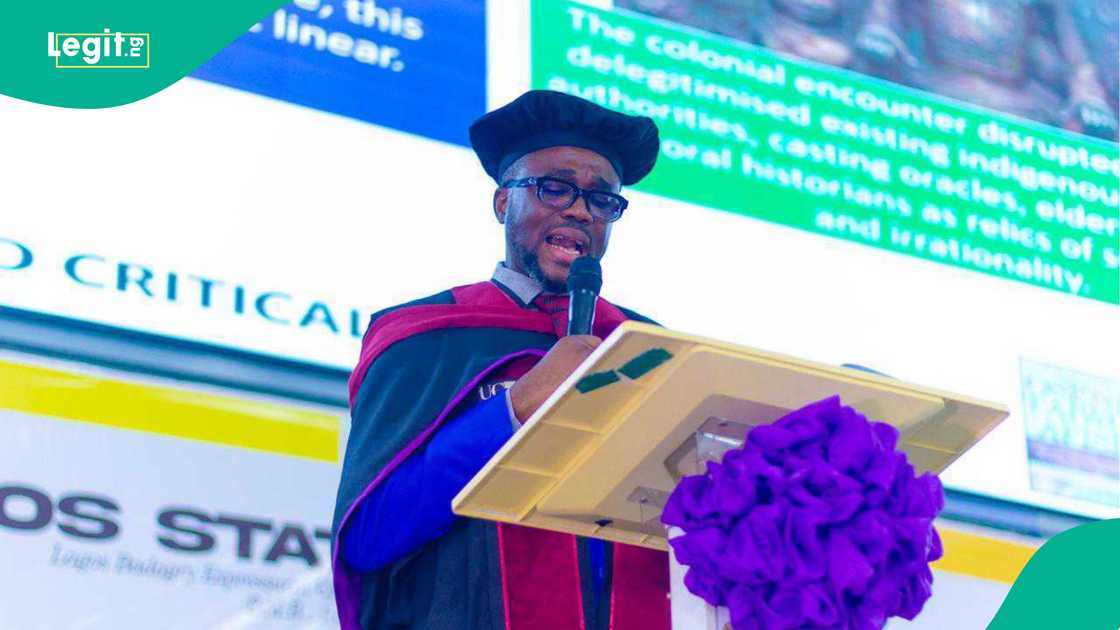'AI Not Replacement for African Knowledge,' Nigerian Professor Speaks
- Taiwo Afisi, deputy vice-chancellor (academics) of Lagos State University (LASU), said artificial intelligence (AI) must be grounded in African values and indigenous knowledge to serve the continent meaningfully
- Afisi spoke while delivering LASU’s 108th inaugural lecture titled “The Oracle and the Open Society: Rethinking the Evolution of Authority and the Pursuit of Epistemic Justice in African Philosophical Thought”
- During the lecture held at the Buba Marwa Auditorium, Ojo campus, Afisi said Africa must move beyond simply acquiring information to embracing ethical, historical awareness, and culturally-anchored wisdom
Legit.ng journalist, Ridwan Adeola Yusuf, has over 9 years of experience covering public journalism.
Ojo, Lagos state - Professor Taiwo Afisi, deputy vice-chancellor (academics) of Lagos State University (LASU), has said artificial intelligence (AI) and data-driven technologies, no matter how advanced, cannot replace the depth and guidance offered by African wisdom and indigenous knowledge systems.
As reported by Vanguard, Prof Afisi, a renowned philosopher and scholar of Logic, Philosophy of Science, and Critical Rationalism, made the submission on Tuesday, July 15, while delivering the university’s 108th inaugural lecture.

Source: Twitter
The Cable also noted the professor's stance.
The lecture was titled “The Oracle and the Open Society: Rethinking the Evolution of Authority and the Pursuit of Epistemic Justice in African Philosophical Thought."
The event, held at the Buba Marwa Auditorium of the Ojo campus, was attended by a cross-section of the university community including academics, students, traditional leaders, and dignitaries from within and outside the state.
In his presentation, Afisi emphasised the need for societies to shift from simply acquiring information to embracing ethical, historically aware, and culturally anchored wisdom.
He argued that in a world increasingly dominated by algorithms and automated systems, what is urgently required is not just data, but insight.
He noted:
“It is no longer enough to be informed. We must be inspired by values, guided by justice, and anchored in the wisdom that our African philosophies provide."
Afisi, who holds the distinction of being the first indigenous professor of philosophy, the first inaugural lecturer in philosophy, and the first professor of philosophy to rise to the position of DVC at LASU, used the opportunity to chart a bold vision for knowledge systems rooted in African thought.
Addressing scholars and researchers, Prof Afisi called for a rethinking of epistemology beyond the confines of Western paradigms.
He therefore advocated for "epistemic pluralism", a call to rigorously engage with indigenous African knowledge systems not as relics, but as relevant frameworks for scientific, moral, and political advancement.
He stated:
“To scholars, we must rethink epistemology beyond the Western canon and embrace epistemic pluralism by engaging indigenous knowledge systems. Research must be rigorous, but also socially responsive."
'AI without ethics risks failure'
On education, the philosophy scholar called for a radical review of the curriculum at all levels to integrate African perspectives in science, logic, ethics, and civic instruction.
He stressed that Africa’s educational architecture must reflect its identity and intellectual autonomy, not through superficial gestures, but substantive, dialogical reasoning and rooted pedagogies.
He said:
“The curriculum must not only be decolonised but also philosophically grounded in African realities."
Addressing Africa's growing technology sector, Prof Afisi noted that digital innovation on the continent must not be limited to the importation or imitation of Western systems.
He urged African tech stakeholders to develop AI systems that embody communal values such as fairness, transparency, and accountability.
He stated:
“Technological development in Africa must go beyond adoption to active design and innovation grounded in African values.
“Algorithmic decision-making tools should be subjected to ethical scrutiny informed by African communitarian ethics such as Ubuntu."
Furthermore, he urged tech innovators to include digital ethics, philosophy of technology, and indigenous knowledge in innovation hubs and academic programmes.
Cultural custodians and community leaders, he advised, must champion the revival and documentation of oral traditions, communal governance models, and symbolic knowledge systems.
He said these should not be treated as mere cultural artefacts rather as evolving and adaptive contributions to civic and intellectual life.
He said:
“Community elders and custodians of culture should be recognised as co-educators and co-thinkers in shaping Africa’s intellectual and moral future."
According to him, wisdom is not simply the possession of knowledge, but its just and meaningful application.
He envisions an African society where technological advancement is tempered by moral clarity, education guided by critical awareness, and governance rooted in dignity, dialogue, and philosophical reflection.
He submitted:
“Let Africa not only thrive in data but lead in wisdom. Let the oracle speak. Let the algorithm listen. Let the people reason together. And may the African open society not be a borrowed idea, but a living tradition, critically reconstructed, philosophically grounded, and ethically sustained."
Read more on Artificial Intelligence:
Using AI to source scholarships
Earlier, Legit.ng reported that expert Tunde Aborode shared his perception on ethical and beneficial use of AI.
Aborode, the research director of the Healthy Africans Platform, United States, explained that AI is a revolution in the modern era. He, however, said that during the search for scholarship opportunities, one needs to understand his or her niche and story.
Source: Legit.ng

